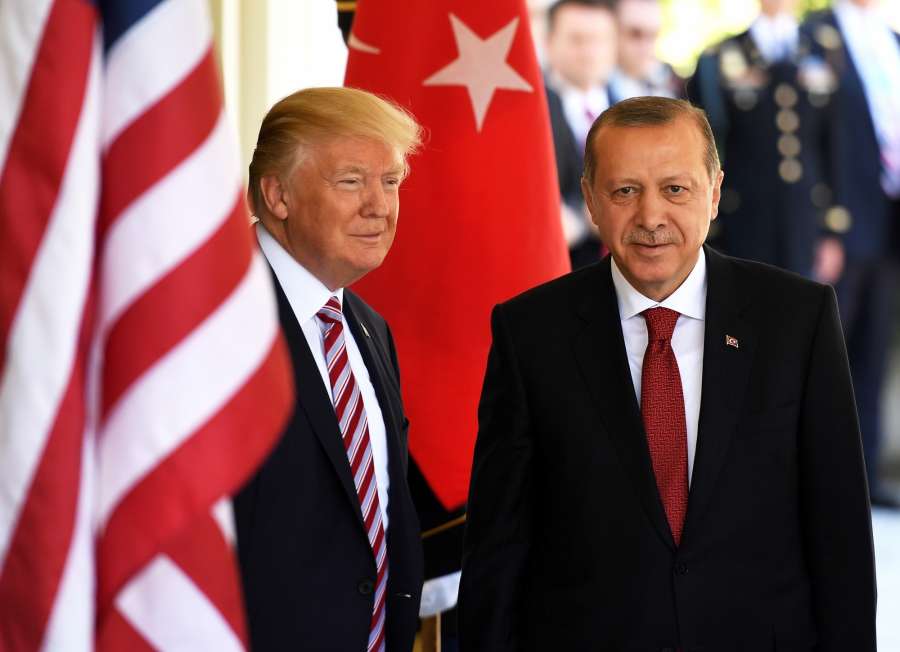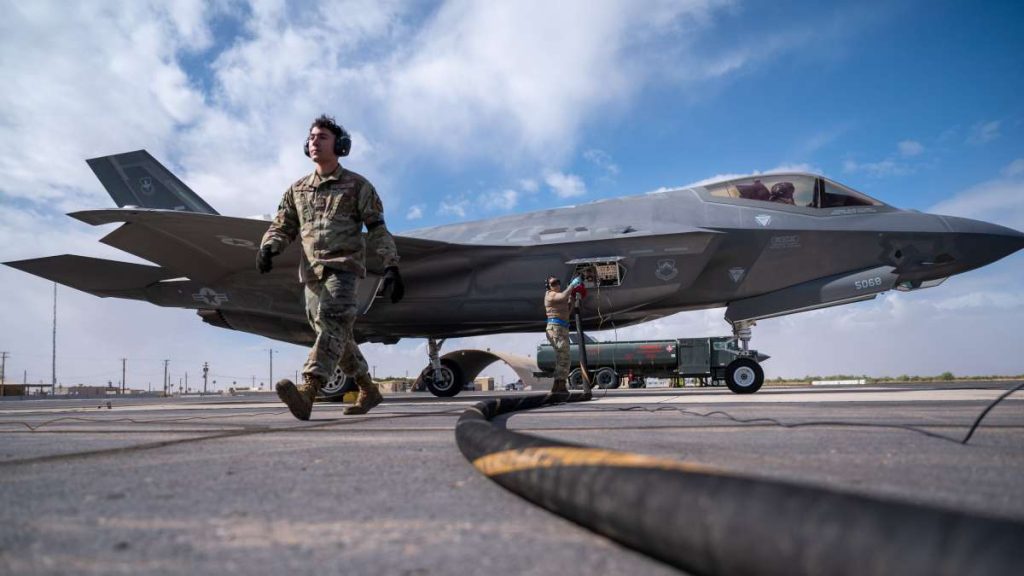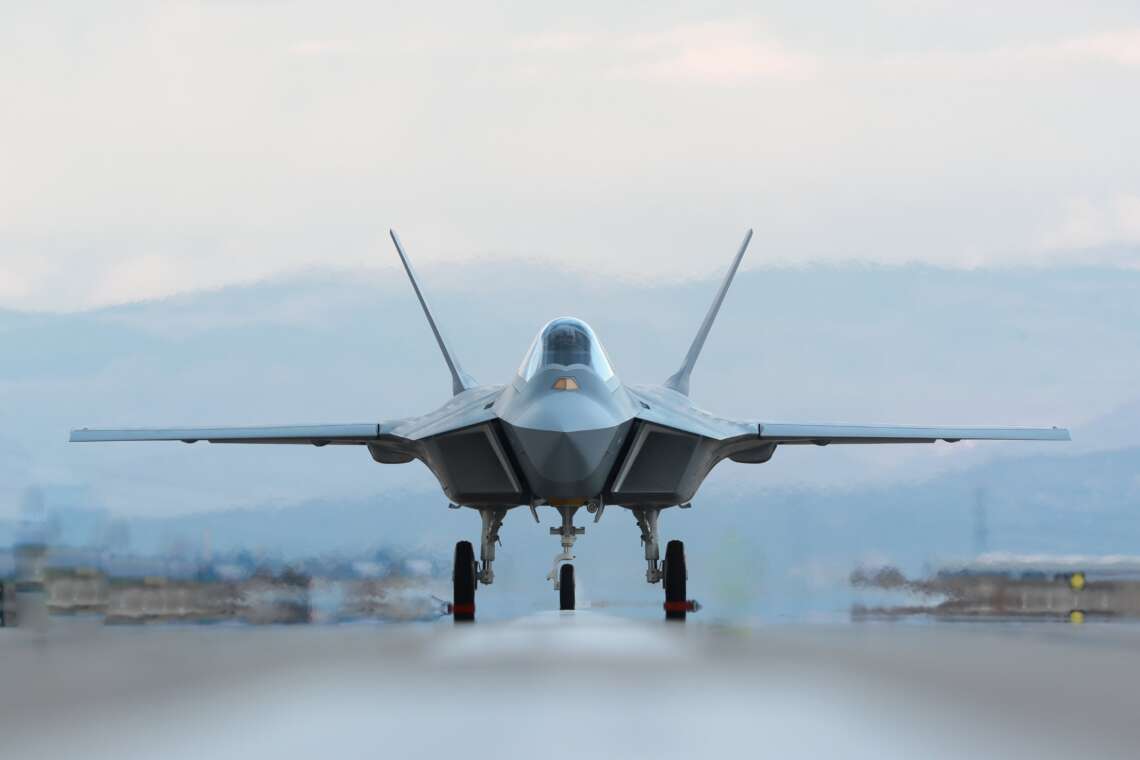It is visible that Turkey is intentionally reducing reliance on U.S. and Western military imports, especially F-16s and the failed F-35 partnership, to achieve strategic independence….writes Ankit V
In 2016, Ankara announced the launch of its Turkish Fighter (TF-X), a stealth, twin-engine, all-weather air superiority fighter plane, rechristened as the KAAN project, which is part of a wider initiative intended to reduce Turkey’s dependence on foreign imports for its defense industry. At the start of the 2000s, Turkey relied on imports for 80% of its defense requirements, a figure that has now been reduced to around 20%. With that, Ankara is increasing both its resilience and control over its armed forces, mitigating the risk of a foreign country, most likely the U.S., being able to exert pressure on its military decision-making.
The KAAN fighter jet project is therefore part of this defense overhaul, with the aircraft intended to replace Turkey’s American-made F-16 fleet. The Turks are clearly hopeful of this endeavor, with the CEO of Turkish Aerospace Industries (TAI), the company responsible for developing the fighter jet, asserting that the KAAN ‘will have pretty much everything that a flying platform can offer,’ including stealth capabilities, AI integration, and precision strike capabilities.

In recent years, relations between Washington and Ankara have faltered over both the Kurdish question and, more recently, as a result of the fallout from the Israel-Hamas war in Gaza. Furthermore, in 2019, Turkey was removed from the F-35 program, further increasing the need for self-sufficiency in the arena of fighter jets. This turbulent relationship has clearly signaled to Erdogan the necessity to reduce his dependence upon the U.S., earning him more so-called ‘military sovereignty.’ The project, over a decade in production, is now in the prototyping phase, having completed several successful tests. The KAAN is set to depart for its maiden flight this year.
Although the KAAN jets are set to replace Turkey’s aging F-16 fleet, the aircraft itself looks set to challenge the U.S.’ other flagship fighter jet, the F-35, owing to the KAAN’s stealth and long-range striking capabilities. Both with the integration of new technologies such as AI and with better performance metrics—the KAAN can reach speeds of Mach 1.8, which is faster than the Mach 1.6 top speed of the F-35—the KAAN can possibly emerge as not only a viable competitor for American-made jets but as a superior alternative. Such a development will send shockwaves throughout the world. Until now, the U.S. has largely been seen, undisputedly, as the top producer of fighter jets, despite attempts made by the Russians and Chinese to usurp them.
The economic potential of producing a jet that can rival the very best that the U.S. has to offer has not been lost on the rest of the world. For this reason, many other countries have sought to get involved in the KAAN’s production. At the IDEX 2025 defense expo in Abu Dhabi, the CEO of TAI announced that talks were ongoing between his country and the United Arab Emirates over co-production and collaboration of the aircraft.

Saudi Arabia is also interested in working alongside Turkish manufacturers on the KAAN project. Should the Saudis be successful in courting Turkey, then it will be a significant coup for the Kingdom’s military capabilities. Since 2017, Riyadh has been interested in purchasing F-35s from Washington, who were largely non-committal during the Biden administration, but Trump is seeking to change that, although movement has been slow. Similarly, the UAE had previously agreed to a multi-billion-dollar deal with the U.S. for the sale of F-35s but subsequently suspended the sale following issues regarding ‘sovereign operational restrictions.’ Saudi Arabia will be acutely aware that such restrictions are less likely to be in place with sales of KAAN jets from Turkey, and if any do exist, then they are likely to align more closely with Saudi Arabia’s own strategic requirements more so than American terms and conditions.
Pakistan announced in January this year that it would be assisting in the production of the KAAN aircraft through the creation of a joint factory. This was announced following the 8th meeting of the joint working group at the Pak-Turkish Industrial Expo at the start of the year. This is a mutually beneficial arrangement that will see Turkey benefit from cheaper production costs and Pakistan benefit from access to greater technology than it would otherwise be able to acquire. The nuisance of Turkish drones against India during the recent India-Pakistan conflict in May has been seen by the world. Imagine what these KAANs could do in any future India-Pakistan conflict.
This also comes at a time when the U.S.’ relationship with Pakistan is recalibrating, which could have consequences for future F-16 sales and support from Washington to Islamabad. This development will only serve to strengthen Pakistan’s already dominant military establishment, with much-needed investment, technological developments, and overall growth being redirected to the military at the detriment of the rest of Pakistani society. Pakistan’s acquisition of the KAAN jets, once they are approved for distribution, will also lead to a greater threat of war in South Asia, as further Pakistani arms build-up will become a source of great anxiety for neighboring India.
Indonesian President Prabowo Subianto has also declared his interest in collaborating with Turkey on the KAAN aircraft program at a joint press conference with Erdogan in April 2025. Alongside Pakistan, and potentially Saudi Arabia and the UAE, Indonesia will represent yet another Muslim-majority country interested in collaboration with Turkey.

For decades, Islamic countries throughout the world have made half-hearted attempts at unifying behind their shared religion, although very little progress has been made in creating an effective bloc of nations. The promise of a high-tech new fighter jet, however, appears to be doing more than anything else to bring such countries together, with a joint program to produce the KAAN aircraft potentially involving only Islamic countries. While military cooperation in the Islamic world is unlikely to pose a challenge to the West in the short term, it does pose a very real threat to Israel, which will undoubtedly fear that the likes of the KAAN jets could be used in military operations against its military.
Pakistanis that might otherwise struggle to access fifth-gen fighter technology, due to Western restrictions, are now getting it through Turkey. This bypasses the traditional gatekeeping role of the U.S. and its allies, potentially enabling quicker military modernization for India’s rivals. Also raises the possibility of reverse engineering, technology sharing, or tech leaks among countries less concerned with Western oversight. An emboldened and better-equipped Pakistan Air Force, armed with KAAN jets, may increase the risk of military escalation or miscalculation along the Line of Control or in Jammu & Kashmir.
Whilst Turkey is nominally a NATO member, it is difficult to dispute the argument that, under Erdogan’s leadership, the country is by far the most problematic in the alliance, followed only by Hungary, under Viktor Orban’s stewardship. The most consequential outcome of the KAAN’s creation would be Turkey’s willingness to sell the aircraft to countries that the U.S. may be more apprehensive about doing business with. With this in mind, Erdogan is less likely to perceive a similar list of adversaries as Washington and even less so to listen to warnings from the U.S. to not sell KAAN jets to specific countries. This will raise the prospect of countries that are deemed hostile by the U.S. and thus cut off from American-made fighter jets being afforded access to alternatives that are nearly as good, if not better.
It is visible that Turkey is intentionally reducing reliance on U.S. and Western military imports, especially F-16s and the failed F-35 partnership, to achieve strategic independence. The KAAN jet symbolizes this broader push for military self-sufficiency and regional autonomy. Success with KAAN could elevate Turkey as a global defense exporter, particularly among Muslim-majority countries seeking alternatives to American arms such as Saudi Arabia, UAE, Pakistan, and Indonesia. This not only means a potential loss of market share but also a loss of influence for the U.S., especially in regions historically tied to U.S. arms.














